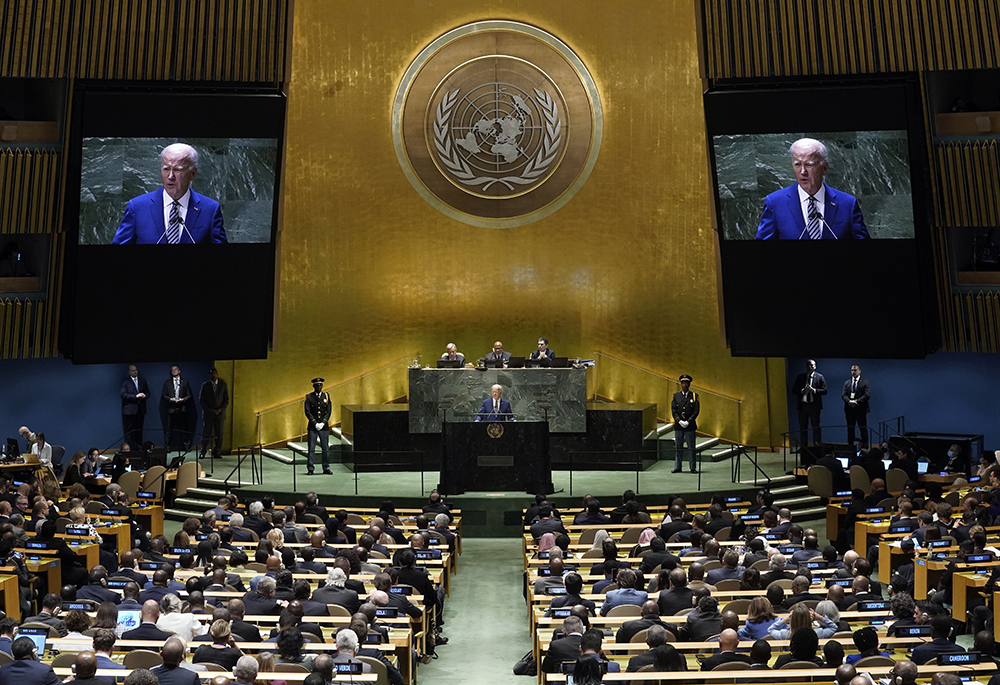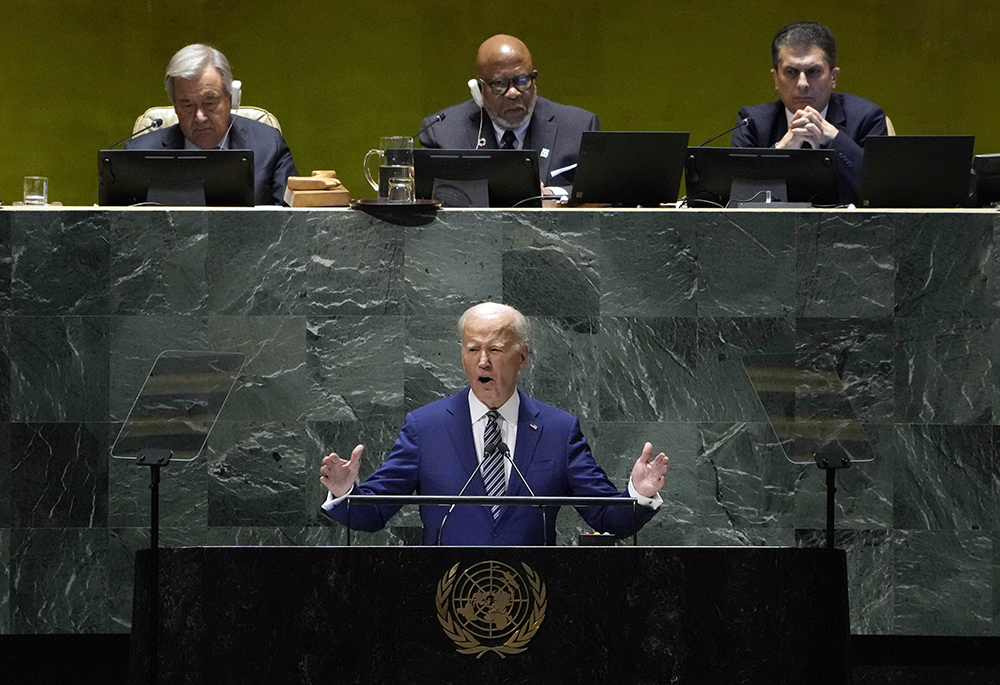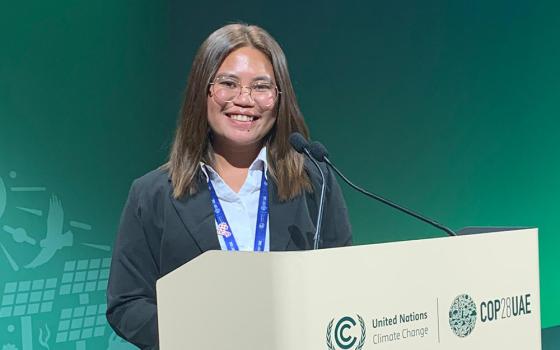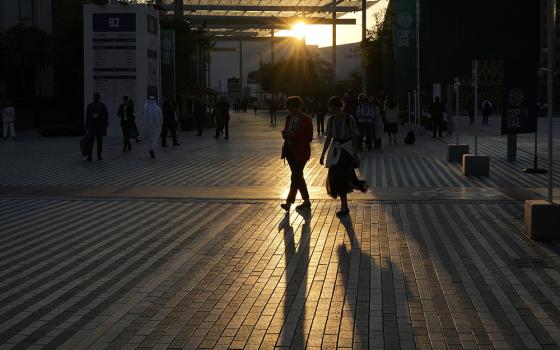
President Joe Biden addresses the 78th session of the United Nations General Assembly on Sept. 19. (AP photo/Richard Drew)
As President Joe Biden urged global cooperation at the United Nations to combat climate change, a coalition of U.S. Catholic organizations is calling on his administration to use debt relief as a means to "unlock critical funding" for countries most vulnerable to the impacts of a rapidly heating world.
The letter campaign, organized by the Catholic Climate Covenant and joined by seven other co-sponsors, asks that the United States forgive or significantly restructure debts it holds with other nations as a central piece of its international climate policy at the upcoming U.N. climate summit, COP28. They argue that such a move "can unlock critical funding to help developing nations meet their goals under the Paris Agreement, adapt to climate change, and address loss and damage."
"Our Catholic faith instructs us to prioritize the needs of our poor and vulnerable neighbors and to care for God’s creation," among them "the peoples of developing countries, least responsible for the climate crisis, [who] suffer many of the most devastating impacts," the groups stated in a letter addressed to Biden, Treasury Secretary Janet Yellen and U.S. climate envoy John Kerry.
Relieving countries of their debt obligations, or significantly lessening the burden, can redirect hundreds of billions of dollars toward investments into clean energy, resilience measures and other climate solutions, the Catholic coalition said in their letter.
By 2030, developing countries will need an estimated $6 trillion to meet less than half of the goals under their national climate pledges, according to a U.N. analysis. A study by the International Institute for Environment and Development found that 59 developing nations from 2011-2021 spent nearly twice as much ($234 billion) paying down debt than what they received ($136 billion) in climate aid.
With the Green Climate Fund yet to meet its goal of $100 billion in annual financing and details for the newly established loss and damage fund still being hammered out, the state of climate financing calls for new approaches, said Jose Aguto, executive director of Catholic Climate Covenant.

President Joe Biden addresses the 78th session of the United Nations General Assembly on Sept. 19. (AP photo/Richard Drew, File)
"For us to have a climate solution that is of scale and commensurate with the actual need, we really need to be ambitious and innovative in unlocking this kind of funding," Aguto told EarthBeat, adding the Catholic coalition framed their call for debt forgiveness "in recognition of how we said in the 'Our Father' forgive each other our debts."
Along with Catholic Climate Covenant, other organizations endorsing the call for climate debt relief are the Laudato Si' Movement, an international network of nearly 900 Catholic organizations, and the Leadership Conference of Women Religious, which represents two-thirds of U.S.-based congregations of Catholic sisters. Others include St. Columban Mission for Justice, Peace and Ecology; the Sisters of Mercy of the Americas Justice Team; Ignatian Solidarity Network; Maryknoll Office for Global Concerns; and Franciscan Action Network.
"If we are serious about addressing the climate crisis and alleviating human suffering, then those of us whose basic needs are comfortably met must prioritize the interests of vulnerable peoples who lack them," the Catholic letter said. "It is a central tenet of our Catholic faith. It is necessary if we are to envision a just and thriving world for all."
The Catholic call for debt relief is part of a climate justice campaign the groups are organizing to mark the Season of Creation, an annual ecumenical period of ecological prayer and action that runs from Sept. 1, the World Day of Prayer for the Care of Creation, to Oct. 4, the feast of St. Francis of Assisi, patron saint of ecology.
At the Season of Creation's conclusion, Pope Francis is set to issue a new apostolic exhortation that will follow up his landmark 2015 encyclical "Laudato Si', on Care for Our Common Home." In that highest-order papal teaching document, Francis spoke of the "ecological debt" between countries in the Global North and Global South.
"The foreign debt of poor countries has become a way of controlling them, yet this is not the case where ecological debt is concerned," the pope wrote. "In different ways, developing countries, where the most important reserves of the biosphere are found, continue to fuel the development of richer countries at the cost of their own present and future."
Advertisement
The issue of climate financing has long been a central point of debate and breakdowns throughout the two-plus decades of international climate negotiations within the United Nations.
In his speech Tuesday (Sept. 19) at the U.N. general assembly — days after tens of thousands, including Catholic groups, marched in New York calling for an end to the burning of fossil fuels, the primary driver of climate change — Biden said he is working with Congress to quadruple climate financing for developing countries, and anticipated the Green Climate Fund will reach its $100 billion target this year.
"But we need more investment from the public and private sector alike, especially in places that have contributed so little to global emissions but face some of the worst effects of climate change, like the Pacific Islands," Biden said, adding that the U.S. is assisting island nations to adapt and build resilience to climate impacts.
Catholic organizations like the Covenant, along with the U.S. bishops' conference and Catholic Relief Services, have advocated for years for the U.S. to meet its obligations for international climate financing. But those efforts have often hit a wall in Congress. According to Roll Call, A December spending bill signed by Biden contained just over $1 billion in climate financing, well below the $5.3 billion sought by the White House. Meanwhile, the U.S. has been reluctant to support a loss and damage fund, partly over concerns of legal repercussions.
Aguto said Catholic Climate Covenant continues to call for the U.S. to contribute its share to both funds, and sees the push for debt forgiveness as a complementary channel for climate financing. The request for debt relief was raised by faith groups during a meeting earlier this year with representatives from the U.S. delegation for COP28.
Support for "debt-for-climate" swaps has gained steam in recent years, including the Bridgetown Initiative proposed by Barbados Prime Minister Mia Mottley. Others have pointed to success from a first-of-its-kind deal between Portugal and Cabo Verde.
"We have to go for the biggest impact solutions," Aguto said.






